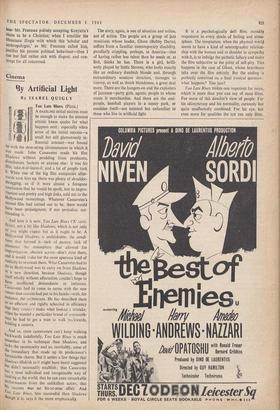Television
Sitchcom
By PETER FORSTER
• In this respect the future looks bleak. Time has just reported that the three major American networks are about to achieve 'the diffieult feat of lowering their own standards.' Apparently, although Westerns still ride high, this winter is planned to be the Armageddon of the `sitchcom,' as Madiscin Avenue calls the situa- tion comedy. Says Time: 'Above all the 1961-2 television season may go down in history as the year that canned laughter made its greatest comeback. Every new sitchcom is a masterpiece of electronic control; three hees and a hah for a cracking knuckle or a lifted eyebrow, a two- decibel avalanche for a two-bit joke.' We have been warned.
What is devoutly to be wished is that some- how we shall be allowed to see Sir Laurence Olivier as Graham Greene's whisky priest in David Susskind's production of The Power and the Glory, by all American accounts a major triumph Also it is fair to note how tar superior the best of imported American var.ei■ shows, like Gene Kelly's last Sunday (BBC) are to our own. But here, too, is the moment to remark how much Eric Maschwitz, who is handing over control of BBC Light Entertainment and going upstairs to an advisory job, has done to raise standards from the sad depths in which he found them. Apart from the occasional aberra- tion of putting on one of his own musical comedies, he has promoted a lot of good, bright, reasonably intelligent variety; in particular, he saw that the small screen could and should use a middlebrow, intimate-revue-type show far removed from the big-show Palladium formula, and with series like On The Bright Side he was well justified.
In fact comedy shows offer more novelty than most because the funny men must perforce be coming up with new ideas. (What a shortage of funny women, by the way.) Benny Hill has been on superb form in the first two of his neW series. His weakness as always is that his humour is entirely derivative, being based on parody of something or somebody, but his send-up of film trailers and, better still, of the greying film star being interviewed on a Picture Parade-type programme must have enchanted even those who had never seen the things he mocked.
Jimmy Edwards is attempting a new line in The Seven Faces of Jim (BBC). Last week ha4 him as a scientist coping with a Thing from Outer Space which changed the sex of those who came too close; as it might be, A for Andro- gynous. Edwards's writers, Muir and Norden, are essentially the best joke-writers in the busi- ness, the most overtly witty and ready to try it on. For this reason, the same trio's Whack-01 comes over better on radio, where it is noW being repeated, because the gags are stronger than the situations. In this they are quite dif• ferent from Galton and Simpson, who until noW have been Tony Hancock's writers—as can be seen from four published scripts, Hancock (Deutsch, 10s. 6d.), fascinatingly instructive as to technique, but funny only in so far as yoU can remember or imagine how Hancock would deliver the lines.
Lastly, the Seven Faces of Jomo, one of which was seen on last Sunday's Face to Face.. I may be told that politics have nothing to do with television criticism, and in a way this is true. But when I see a man who was convicted by law Of complicity in Mau Mau being treated as Ken- yatta was treated by Mr. John Freeman, even to talk of 'the sad period you were in gaol'; when I hear Mr. Freeman talking of rehabilitation prac- tised 'on all sorts of people who were detained,' and reflect that these were Mau Mau; when 1 hear Mr. Freeman politely accepting Kenyatta's Claim to be a Christian; when I consider the Messianic illogic with which this 'scholar and anthropologist,' as Mr. Freeman called him, justifies his present political behaviour—then I Can but feel rather sick with disgust, and con- tempt for all concerned.







































 Previous page
Previous page